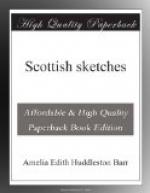Alas! the watch begun that night was one Jenny had very often to keep afterwards. David’s troubles gathered closer and closer round him, and the more trouble he had the deeper he drank. Within a month after that first shameful homecoming the firm of Callendar & Leslie went into sequestration. John felt the humiliation of this downcome in a far keener way than David did. His own business record was a stainless one; his word was as good as gold on Glasgow Exchange; the house of John Callendar & Co. was synonymous with commercial integrity. The prudent burghers who were his nephew’s creditors were far from satisfied with the risks David and Robert Leslie had taken, and they did not scruple to call them by words which hurt John Callendar’s honor like a sword-thrust. He did not doubt that many blamed him for not interfering in his nephew’s extravagant business methods; and he could not explain to these people how peculiarly he was situated with regard to David’s affairs; nor, indeed, would many of them have understood the fine delicacy which had dictated John’s course.
It was a wretched summer every way. The accountant who had charge of David’s affairs was in no hurry to close up a profitable engagement, and the creditors, having once accepted the probable loss, did not think it worth while to deny themselves their seaside or Highland trips to attend meetings relating to Callendar & Leslie. So there was little progress made in the settlement of affairs all summer, and David was literally out of employment. His uncle’s and his children’s presence was a reproach to him, and Robert and he only irritated each other with mutual reproaches. Before autumn brought back manufacturers and merchants to their factories and offices David had sunk still lower. He did not come home any more when he felt that he had drunk too much. He had found out houses where such a condition was the natural and the most acceptable one—houses whose doors are near to the gates of hell.
This knowledge shocked John inexpressibly, and in the depth of his horror and grief he craved some human sympathy.
“I must go and see Dr. Morrison,” he said one night to Jenny.
“And you’ll do right, deacon; the grip o’ his hand and the shining o’ his eyes in yours will do you good; forbye, you ken weel you arena fit to guide yoursel’, let alane Davie. You are too angry, and angry men tell many a lie to themsel’s.”
There is often something luminous in the face of a good man, and Dr. Morrison had this peculiarity in a remarkable degree. His face seemed to radiate light; moreover, he was a man anointed with the oil of gladness above his fellows, and John no sooner felt the glow of that radiant countenance on him than his heart leaped up to welcome it.
“Doctor,” he said, choking back his sorrow, “doctor, I’m fain to see you.”
“John, sit down. What is it, John?”
“It’s David, minister.”




